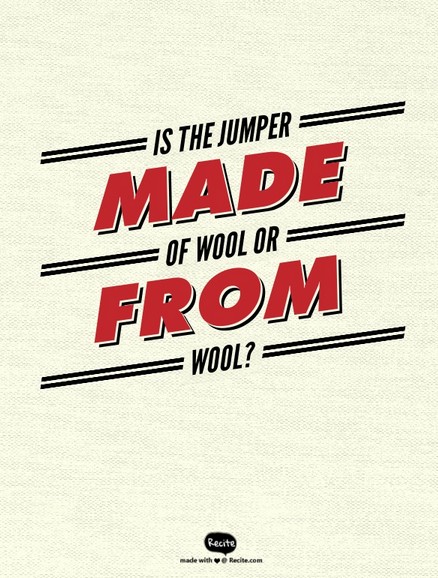Today the focus is on the verb “make” and what it means when it collocates with four
different prepositions, namely” from”, “of” “by” and “with”. Choosing the right preposition can be a bit tricky sometimes. I hope the explanation below helps you understand a bit better the differences.
 She claimed that the jumper was made from wool
She claimed that the jumper was made from wool
 She claimed that the jumper was made of wool
She claimed that the jumper was made of wool
 Many components are made by plastic
Many components are made by plastic
 Many components are made of plastic
Many components are made of plastic
 Margarine, which is made by natural ingredients, is more acceptable
Margarine, which is made by natural ingredients, is more acceptable
 Margarine, which is made from natural ingredients, is more acceptable
Margarine, which is made from natural ingredients, is more acceptable
♥Use made from when the original materials have been completely changed  and cannot be recognised. “Bread is made from flour and water”.
and cannot be recognised. “Bread is made from flour and water”.
♥ Use made of when the original materials have not been completely changed and you can still see them. “Their dining table is made of solid oak”.
♥ Use made by when you mention the name of the company or person that has made something (NOT the names of materials). “This new razon is made by Wilkinson Sword”.
♥Use made with to talk about one of several ingredients or materials (for example in cooking). “Paella is made with rice “
Source: Longman Dictionary of Common Errors and Practical English Usage
Now, let’s try a quiz!
His jacket is made ___leather
Penicillin was discovered ___ A. Fleming
Spanish omelette is made __ potatoes
All our furniture is made __ wood
This sweater was knit ___ my granny
Blog de Cristina is also on Facebook. Click to follow





 She claimed that the jumper was
She claimed that the jumper was  She claimed that the jumper was
She claimed that the jumper was  and cannot be recognised. “
and cannot be recognised. “